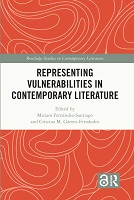Chapter 6 “The Ones We Love Are Enemies of the State”
Proposal review
Mourners and Trespassers in Kamila Shamsie’s Home Fire (2017)
| dc.contributor.author | Sánchez-Palencia, Carolina | |
| dc.date.accessioned | 2023-10-02T12:55:53Z | |
| dc.date.available | 2023-10-02T12:55:53Z | |
| dc.date.issued | 2023 | |
| dc.identifier.uri | https://library.oapen.org/handle/20.500.12657/76528 | |
| dc.language | English | en_US |
| dc.subject.other | Judith Butler, Kamila Shamsie, Home Fire, Islamophobia, Violence | en_US |
| dc.title | Chapter 6 “The Ones We Love Are Enemies of the State” | en_US |
| dc.title.alternative | Mourners and Trespassers in Kamila Shamsie’s Home Fire (2017) | en_US |
| dc.type | chapter | |
| oapen.abstract.otherlanguage | This chapter draws on Judith Butler’s (2009) theorization on the uneven distribution of grievability and Achille Mbembe’s (2003) notion of necropolitics to explain different forms of subjugation to the power of death and mourning in contexts where citizens are deprived of their rights and transformed into trespassers. Theresa May’s policy of stripping terror suspects of their British citizenship is one of such contexts inspiring Kamila Shamsie’s Home Fire (2017), written in a context of Islamophobia and oppressive counter-terror politics. The chapter explores the writer’s challenge to utopian discourses on cosmopolitanism and border-crossing through her depiction of characters subjected to legal ambiguity and statelessness. Yet, it proposes that Shamsie’s postcolonial rewriting of Sophocles’s Antigone be understood in light of Butler’s (2016) rethinking of vulnerability and resistance, as it is precisely through the invocation of this rebellious figure that patronizing discourses defining the vulnerable subject (identified in the novel as female, Muslim, and immigrant) can be dismantled. Contesting orientalist and masculinist assumptions, Home Fire opens up new configurations of racialized and gendered vulnerabilities defying the dominant hierarchies of corporeal value that this chapter examines by focusing on Shamsie’s enactment of embodied interventions, transgressive expressions of mourning, and different forms of resistance to institutional violence. | en_US |
| oapen.identifier.doi | 10.4324/9781032130323-7 | en_US |
| oapen.relation.isPublishedBy | 7b3c7b10-5b1e-40b3-860e-c6dd5197f0bb | en_US |
| oapen.relation.isPartOfBook | ea51c79a-9a33-4946-8aa2-e65d2ef4cead | en_US |
| oapen.relation.isFundedBy | Junta de Andalucía | en_US |
| oapen.relation.isbn | 9781032130316 | en_US |
| oapen.relation.isbn | 9781032424057 | en_US |
| oapen.imprint | Routledge | en_US |
| oapen.pages | 16 | en_US |
| oapen.remark.public | Consejería de Universidad, Investigación e Innovación de la Junta de Andalucía and FEDER Una manera de hacer Europa | |
| peerreview.anonymity | Single-anonymised | |
| peerreview.id | bc80075c-96cc-4740-a9f3-a234bc2598f1 | |
| peerreview.open.review | No | |
| peerreview.publish.responsibility | Publisher | |
| peerreview.review.stage | Pre-publication | |
| peerreview.review.type | Proposal | |
| peerreview.reviewer.type | Internal editor | |
| peerreview.reviewer.type | External peer reviewer | |
| peerreview.title | Proposal review | |
| oapen.review.comments | Taylor & Francis open access titles are reviewed as a minimum at proposal stage by at least two external peer reviewers and an internal editor (additional reviews may be sought and additional content reviewed as required). |

